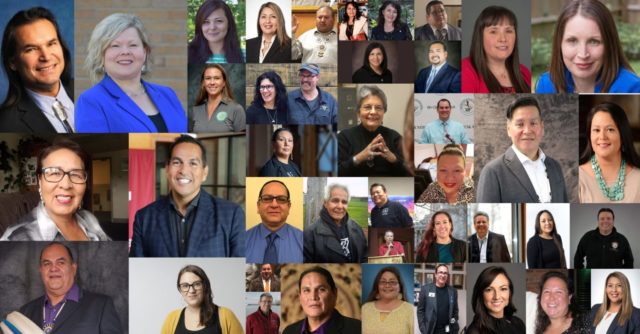Every year since our founding five years ago, we have recognized Wisconsin’s most influential Black and Latino leaders. It’s become the most anticipated thing we do. Every year, I’ve intended these lists to highlight the beauty of the diversity across our state. I want kids here in Wisconsin to see role models of people who are succeeding, to know that it’s possible for African Americans and Latinos to achieve great things here.
Every year, after we publish every list, we hear from the community. We hear genuine excitement and gratitude for the recognition. We hear new names to include in future lists.
And, invariably, we hear, “When will you honor leaders from other communities of color?”
The truth is that we have wanted to. For several years, we have wanted and intended to honor our Native American and Asian American brothers and sisters. But the fact is we can only do so with the help, trust and engagement of those communities. We have spent the last few years building that trust, building those relationships, learning about those communities.
And now, finally, I am confident — we are ready.
This list represents something that’s never been done. This week we shine a statewide spotlight on the dedicated leaders of Wisconsin’s indigenous communities. The people we highlight this week are elected leaders, business leaders, community leaders, doing difficult, important work, often in the face of discrimination and literally generations of oppression.
And there will be more — later this year, we will publish our first list of Wisconsin’s most influential Asian Americans, in addition to new editions of our lists of the most powerful Black and Latino leaders.
We are also aware that this list, like every other, is not comprehensive. There are, without a doubt, more than 38 influential Native American leaders doing good work in Wisconsin. We hope you will let us know about people in your community who we can include on future lists. For now, though, we just want to introduce you to a few of the people doing the work, often behind the scenes and without the accolades, across Wisconsin.
You might know a few of these names, but there’s a good chance that most of them will be new to you. I commend you to get to know them. Reach out to those living and working in your communities. Learn from them, network, create partnerships. And spread the word — let others in your network know that we have people of all ethnicities living and working across Wisconsin to make this state a good and prosperous place for all.
Henry Sanders, Jr
CEO, 365 Media Foundation
Publisher, Madison365 and FoxValley365
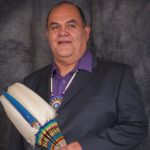 Ned Daniels, Jr. is the chairman for the Forest County Potawatomi Community, a band of the Potawatomi, many of whom live on the Forest County Potawatomi Indian Reservation. Last month, Daniels, Jr. delivered the State of the Tribes address at the Wisconsin state Capitol where he urged Wisconsin policymakers to work together to fight the scourge of opioid abuse that he said was hitting the state’s native populations very hard.
Ned Daniels, Jr. is the chairman for the Forest County Potawatomi Community, a band of the Potawatomi, many of whom live on the Forest County Potawatomi Indian Reservation. Last month, Daniels, Jr. delivered the State of the Tribes address at the Wisconsin state Capitol where he urged Wisconsin policymakers to work together to fight the scourge of opioid abuse that he said was hitting the state’s native populations very hard.
 Jenny Van Sickle, an Alaskan Native of Tlingit and Athabaskan heritage, is the first person of color to serve on the Superior City Council. She has been elected twice with “overwhelming support” and in 2019 won the Women of Excellence from Wisconsin Leadership Summit. She is known as a strong voice for the underrepresented population of Northern Wisconsin and takes on the toughest challenges.In August 2019, she co-sponsored a bill in Superior that prohibits the use of conversion therapy LGBTQ+ and supported the efforts of the Mayor’s Commission for Communities of Color to formally recognize Indigenous Peoples Day.
Jenny Van Sickle, an Alaskan Native of Tlingit and Athabaskan heritage, is the first person of color to serve on the Superior City Council. She has been elected twice with “overwhelming support” and in 2019 won the Women of Excellence from Wisconsin Leadership Summit. She is known as a strong voice for the underrepresented population of Northern Wisconsin and takes on the toughest challenges.In August 2019, she co-sponsored a bill in Superior that prohibits the use of conversion therapy LGBTQ+ and supported the efforts of the Mayor’s Commission for Communities of Color to formally recognize Indigenous Peoples Day.
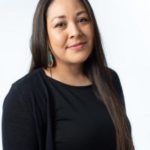 Danielle Yancey, who comes from the Menominee and Santee Dakota Sioux Nations, is the director for the Native American Center for Health Professions at the School of Medicine and Public Health at University of Wisconsin-Madison. She has worked in public service for 15 years focusing on programs that promote social justice, according to her personal bio. Previously, she served as the tribal liaison for the State of Wisconsin Department of Transportation in tribal affairs and as the Career Pathways coordinator at UW Health focusing on workforce development in the healthcare system. Yancey is also co-founder of the nonprofit organization, Spirit of a Woman, which empowers and uplifts indigenous girls and women.
Danielle Yancey, who comes from the Menominee and Santee Dakota Sioux Nations, is the director for the Native American Center for Health Professions at the School of Medicine and Public Health at University of Wisconsin-Madison. She has worked in public service for 15 years focusing on programs that promote social justice, according to her personal bio. Previously, she served as the tribal liaison for the State of Wisconsin Department of Transportation in tribal affairs and as the Career Pathways coordinator at UW Health focusing on workforce development in the healthcare system. Yancey is also co-founder of the nonprofit organization, Spirit of a Woman, which empowers and uplifts indigenous girls and women.
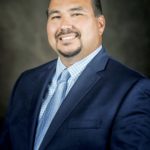 Tehassi Hill is the Chairman of the Oneida Nation. Prior to his current role, Chairman Hill served two terms as a Council Member for the Oneida Business Committee, the elected government officials for the Oneida Nation. On behalf of the Oneida Nation, Chairman Hill serves on the Board of Directors for the Great Lakes Inter-Tribal Council, which is a consortium of 11 Tribes in Wisconsin and Lac Vieau Desert of Michigan and is liaison for the National Congress of American Indians. Chairman Hill also serves on the Natural Resources Damage Trustee Council and is a designee to the Environmental Protection Agency’s Regional Tribal Operating Committee. Chairman Hill was born and raised on the Oneida reservation and graduated from the Oneida Nation High school. He studied Business Administration at the UW-Green Bay and operated a successful industrial, commercial, and residential painting business for six years prior to working in tribal government. Chairman Hill and his wife, Kanatihal, have nine children and reside in Oneida, Wisconsin. He likes to spend his leisure time hunting, fishing and being actively engaged with his family and the greater community
Tehassi Hill is the Chairman of the Oneida Nation. Prior to his current role, Chairman Hill served two terms as a Council Member for the Oneida Business Committee, the elected government officials for the Oneida Nation. On behalf of the Oneida Nation, Chairman Hill serves on the Board of Directors for the Great Lakes Inter-Tribal Council, which is a consortium of 11 Tribes in Wisconsin and Lac Vieau Desert of Michigan and is liaison for the National Congress of American Indians. Chairman Hill also serves on the Natural Resources Damage Trustee Council and is a designee to the Environmental Protection Agency’s Regional Tribal Operating Committee. Chairman Hill was born and raised on the Oneida reservation and graduated from the Oneida Nation High school. He studied Business Administration at the UW-Green Bay and operated a successful industrial, commercial, and residential painting business for six years prior to working in tribal government. Chairman Hill and his wife, Kanatihal, have nine children and reside in Oneida, Wisconsin. He likes to spend his leisure time hunting, fishing and being actively engaged with his family and the greater community
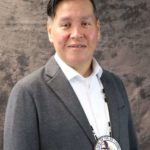 Marlon WhiteEagle is president of the Ho-Chunk Nation, an office he won in June 2019. Prior to his election, he was editor of the Nation’s newspaper, Hocak Worak, where he earned national awards for his photography, reporting, and editorials. After being elected, he said he plans to increase transparency and accountability within the Nation. He has initiated YouTube video messages to share information with tribal members. He also hosts the podcast “Ho-Chunk Voice.” President WhiteEagle is a veteran of the U.S. Marine Corps and holds a Liberal Arts degree from MiraCosta College.
Marlon WhiteEagle is president of the Ho-Chunk Nation, an office he won in June 2019. Prior to his election, he was editor of the Nation’s newspaper, Hocak Worak, where he earned national awards for his photography, reporting, and editorials. After being elected, he said he plans to increase transparency and accountability within the Nation. He has initiated YouTube video messages to share information with tribal members. He also hosts the podcast “Ho-Chunk Voice.” President WhiteEagle is a veteran of the U.S. Marine Corps and holds a Liberal Arts degree from MiraCosta College.
 Wenona Wolf is policy and legislative director for Wisconsin Lt. Governor Mandela Barnes. A member of the Mille Lacs Band of Ojibwe, Wolf spent 10 years as communications and development director for Kids Forward (formerly known as Wisconsin Council of Children and Families). She served as president of the board of Community Shares of Wisconsin and vice president of the board of the Native American health organization We Are Healers. She also served on the boards of Planned Parenthood Advocates of Wisconsin, Wisconsin Alliance for Women’s Health, Bayview Foundation and Wisconsin Women’s Network. In 2017 she earned both national and local recognition as one of the Native American 40 Under 40 and a Brava Magazine “Woman to Watch.”
Wenona Wolf is policy and legislative director for Wisconsin Lt. Governor Mandela Barnes. A member of the Mille Lacs Band of Ojibwe, Wolf spent 10 years as communications and development director for Kids Forward (formerly known as Wisconsin Council of Children and Families). She served as president of the board of Community Shares of Wisconsin and vice president of the board of the Native American health organization We Are Healers. She also served on the boards of Planned Parenthood Advocates of Wisconsin, Wisconsin Alliance for Women’s Health, Bayview Foundation and Wisconsin Women’s Network. In 2017 she earned both national and local recognition as one of the Native American 40 Under 40 and a Brava Magazine “Woman to Watch.”
 Curt and Linda Basina, members of the Red Cliff band of Lake Superior Chippewa, own and operate Copper Crow Distillery near Bayfield, becoming the first Native American distillery owners in the United States when they opened in April 2018. They opened on private land within the Red Cliff Reservation, which exempted them from a 200-year-old ban on distilling alcohol on tribal lands. (That ban was finally lifted just a few months after Copper Crow opened.) They’ve been a couple since high school and hatched the idea for Copper Crow during road trips to visit distilleries and wineries. That wandering led, in part, to the name: “Like the crow, we wondered about our purpose,” they wrote on the Copper Crow website. “Why are we working so hard? How can we contribute to our community? How can we share our enjoyment and the bounty of this beautiful, pure, Lake Superior place? Like the crow, we have wandered. As we’ve wandered, we’ve made connections with our neighbors. As we’ve connected, we’ve learned to enjoy what is closest to us.”
Curt and Linda Basina, members of the Red Cliff band of Lake Superior Chippewa, own and operate Copper Crow Distillery near Bayfield, becoming the first Native American distillery owners in the United States when they opened in April 2018. They opened on private land within the Red Cliff Reservation, which exempted them from a 200-year-old ban on distilling alcohol on tribal lands. (That ban was finally lifted just a few months after Copper Crow opened.) They’ve been a couple since high school and hatched the idea for Copper Crow during road trips to visit distilleries and wineries. That wandering led, in part, to the name: “Like the crow, we wondered about our purpose,” they wrote on the Copper Crow website. “Why are we working so hard? How can we contribute to our community? How can we share our enjoyment and the bounty of this beautiful, pure, Lake Superior place? Like the crow, we have wandered. As we’ve wandered, we’ve made connections with our neighbors. As we’ve connected, we’ve learned to enjoy what is closest to us.”
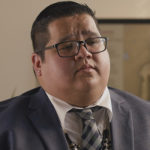 David O’Connor has been the Education Consultant for American Indian Studies Program at the Wisconsin Department of Public Instruction since 2012. O’Connor is a member of the Bad River Band of Lake Superior Chippewa. As the Education Consultant, O’Connor supports school districts’ efforts to provide history on the culture and tribal sovereignty of Wisconsin’s Tribal Nations and communities. He also provides training opportunities and workshops throughout Wisconsin on American Indian education. O’Connor is also the grant director for the Network for Native American Student Achievement.
David O’Connor has been the Education Consultant for American Indian Studies Program at the Wisconsin Department of Public Instruction since 2012. O’Connor is a member of the Bad River Band of Lake Superior Chippewa. As the Education Consultant, O’Connor supports school districts’ efforts to provide history on the culture and tribal sovereignty of Wisconsin’s Tribal Nations and communities. He also provides training opportunities and workshops throughout Wisconsin on American Indian education. O’Connor is also the grant director for the Network for Native American Student Achievement.
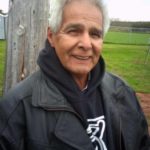 Garland McGeshick is chairman of the Sokaogon Chippewa Community Mole Lake Band of Lake Superior Chippewa, a position he earned in 2018 by narrowly defeating incumbent Chris McGeshick in tribal elections. As chairman he represents about 1,500 community members. The community operates Mole Lake Casino and Lodge just south of Crandon, Wisconsin.
Garland McGeshick is chairman of the Sokaogon Chippewa Community Mole Lake Band of Lake Superior Chippewa, a position he earned in 2018 by narrowly defeating incumbent Chris McGeshick in tribal elections. As chairman he represents about 1,500 community members. The community operates Mole Lake Casino and Lodge just south of Crandon, Wisconsin.
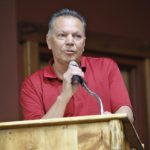 Louis Taylor is currently the Tribal Chairman of the Lac Courte Oreilles Tribe, representing just over 7,000 members. The Lac Courtre Oreilles reservation, recognized in an 1854 treaty, has a population just over 3,000. Taylor was elected in 2017 after more than 10 years of previous service on the governing board. The band operates several business enterprises, including LCO Casino Lodge, Gindstone Creek Casino, a cranberry marsh, a construction development company, The Landing resort and more.
Louis Taylor is currently the Tribal Chairman of the Lac Courte Oreilles Tribe, representing just over 7,000 members. The Lac Courtre Oreilles reservation, recognized in an 1854 treaty, has a population just over 3,000. Taylor was elected in 2017 after more than 10 years of previous service on the governing board. The band operates several business enterprises, including LCO Casino Lodge, Gindstone Creek Casino, a cranberry marsh, a construction development company, The Landing resort and more.
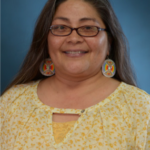 Gail Nahwahquaw is the Director of the Wisconsin Department of Health Tribal Affairs Office. Nahwahquaw, who is a member of the Menominee Nation, works with her team to administer health services to tribes and educate employees within the Department of Health Services about different tribal communities to ensure the services are culturally appropriate. The office works in partnership with Wisconsin’s 11 federally recognized tribes, the Great Lakes Inter-Tribal Council and the Gerald L. Ignace Indian Health Center to aid tribal communities.
Gail Nahwahquaw is the Director of the Wisconsin Department of Health Tribal Affairs Office. Nahwahquaw, who is a member of the Menominee Nation, works with her team to administer health services to tribes and educate employees within the Department of Health Services about different tribal communities to ensure the services are culturally appropriate. The office works in partnership with Wisconsin’s 11 federally recognized tribes, the Great Lakes Inter-Tribal Council and the Gerald L. Ignace Indian Health Center to aid tribal communities.
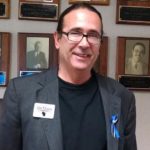 Paul DeMain is the editor and CEO of Indian Country Communications. He is a member of the Oneida nation, of Ojibwe decentand lives in Madison. Indian Country Communications is a Native-owned reservation-based business that produces IndianCountryTV and publishes News From Indian Country, according to its website. DeMain has been the Indian Country Communications CEO since 1986. From 1982-86, DeMain was the Indian Affairs Policy Advisor under Governor Anthony Earl, becoming the first Native American to be appointed as a policy adviser in Wisconsin Governor’s office.
Paul DeMain is the editor and CEO of Indian Country Communications. He is a member of the Oneida nation, of Ojibwe decentand lives in Madison. Indian Country Communications is a Native-owned reservation-based business that produces IndianCountryTV and publishes News From Indian Country, according to its website. DeMain has been the Indian Country Communications CEO since 1986. From 1982-86, DeMain was the Indian Affairs Policy Advisor under Governor Anthony Earl, becoming the first Native American to be appointed as a policy adviser in Wisconsin Governor’s office.
 Craig Anderson, a member of the Sisseton Wahpeton Oyate Tribe, is the executive director and founding member of the American Indian Chamber of Commerce of Wisconsin. He is also a founding member of the First American Capital Corp. which is the business financial arm of the AICCW. It offers a strong support system for Native American entrepreneurs in Wisconsin. For nearly 20 years, Anderson has assisted hundreds of small businesses in mentoring, consulting and lending, according to the AICCW website.
Craig Anderson, a member of the Sisseton Wahpeton Oyate Tribe, is the executive director and founding member of the American Indian Chamber of Commerce of Wisconsin. He is also a founding member of the First American Capital Corp. which is the business financial arm of the AICCW. It offers a strong support system for Native American entrepreneurs in Wisconsin. For nearly 20 years, Anderson has assisted hundreds of small businesses in mentoring, consulting and lending, according to the AICCW website.
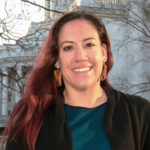 Arvina Martin is the first Native American woman to be elected to the Madison City Council, representing District 11 as alder. She assumed office on April 18, 2017, and then won re-election in 2019. Previously, Martin was a policy analyst and statewide tribal liaison for the Wisconsin Department of Transportation. She has also served as a voter protection fellow, American Indian outreach coordinator, and communications intern for the Democratic Party of Wisconsin, the chief communications officer for the Ho-Chunk Nation Legislature, the campaign manager for Ellen for Assembly, the Native vote director for Organizing for America-Wisconsin, and an admissions advisor for the University of Wisconsin, Madison. Born and raised in Madison, Arvina has dedicated her career to improving her community.
Arvina Martin is the first Native American woman to be elected to the Madison City Council, representing District 11 as alder. She assumed office on April 18, 2017, and then won re-election in 2019. Previously, Martin was a policy analyst and statewide tribal liaison for the Wisconsin Department of Transportation. She has also served as a voter protection fellow, American Indian outreach coordinator, and communications intern for the Democratic Party of Wisconsin, the chief communications officer for the Ho-Chunk Nation Legislature, the campaign manager for Ellen for Assembly, the Native vote director for Organizing for America-Wisconsin, and an admissions advisor for the University of Wisconsin, Madison. Born and raised in Madison, Arvina has dedicated her career to improving her community.
 Tricia Zunker is a Justice of the Ho-Chunk Nation Supreme Court, president of the Wausau Board of Education and the Democratic nominee to represent Northern Wisconsin in the United States Congress. She is founding director of Central Wisconsin Indigenous Peoples’ Day Committee and successfully led the effort to have the City of Wausau and Marathon County recognize Indigenous Peoples’ Day on the first Monday in October. In addition, she teaches and serves as Dean of Faculty at California School of Law. She also teaches in the Legal Studies department at University of Maryland and in the Criminal Justice department at Colorado State University-Global Campus. and on the Board of Directors for the ACLU of Wisconsin, including serving on the Executive Committee. She is also a member of Wisconsin Tribal Judges Association, National American Indian Court Judges Association, National Native American Bar Association, Wisconsin Indian Education Association and the State Bar of California.
Tricia Zunker is a Justice of the Ho-Chunk Nation Supreme Court, president of the Wausau Board of Education and the Democratic nominee to represent Northern Wisconsin in the United States Congress. She is founding director of Central Wisconsin Indigenous Peoples’ Day Committee and successfully led the effort to have the City of Wausau and Marathon County recognize Indigenous Peoples’ Day on the first Monday in October. In addition, she teaches and serves as Dean of Faculty at California School of Law. She also teaches in the Legal Studies department at University of Maryland and in the Criminal Justice department at Colorado State University-Global Campus. and on the Board of Directors for the ACLU of Wisconsin, including serving on the Executive Committee. She is also a member of Wisconsin Tribal Judges Association, National American Indian Court Judges Association, National Native American Bar Association, Wisconsin Indian Education Association and the State Bar of California.
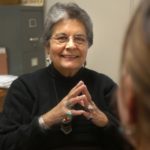 Ada Deer, a longtime champion of Native American rights, human rights and social justice, was the first woman to head the U.S. Bureau of Indian Affairs and the first Native American woman from Wisconsin to run for United States Congress. A member of the Menominee tribe, Deer was born in Keshena, Wisconsin in 1935. She earned a bachelor’s degree from the University of Wisconsin-Madison and a Master of Social Work from the New York School of Social Work (later Columbia University School of Social Work). In 1992, Ada became the first American Indian woman to win the nomination of a major political party for Congress, when she won the Democratic nomination for the 2nd District. After losing the general election, Ada applied for and became the assistant secretary for Indian Affairs for President Bill Clinton—the first woman to hold the position. During her tenure, 226 Alaskan Native villages, as well as American Indian tribes in California and Michigan, received federal recognition. This past January, Deer was honored with the City-County Reverend Dr. Martin Luther King, Jr. Humanitarian Award given to Madison-area community members who reflect the values of Dr. Martin Luther King, Jr. Deer is also the author of a memoir, Making a Difference: My Fight for Native Rights and Social Justice. As an educator and social worker, she taught classes at the UW-Madison School of Social Work and, in 2000, she became director of the American Indian Studies Program.
Ada Deer, a longtime champion of Native American rights, human rights and social justice, was the first woman to head the U.S. Bureau of Indian Affairs and the first Native American woman from Wisconsin to run for United States Congress. A member of the Menominee tribe, Deer was born in Keshena, Wisconsin in 1935. She earned a bachelor’s degree from the University of Wisconsin-Madison and a Master of Social Work from the New York School of Social Work (later Columbia University School of Social Work). In 1992, Ada became the first American Indian woman to win the nomination of a major political party for Congress, when she won the Democratic nomination for the 2nd District. After losing the general election, Ada applied for and became the assistant secretary for Indian Affairs for President Bill Clinton—the first woman to hold the position. During her tenure, 226 Alaskan Native villages, as well as American Indian tribes in California and Michigan, received federal recognition. This past January, Deer was honored with the City-County Reverend Dr. Martin Luther King, Jr. Humanitarian Award given to Madison-area community members who reflect the values of Dr. Martin Luther King, Jr. Deer is also the author of a memoir, Making a Difference: My Fight for Native Rights and Social Justice. As an educator and social worker, she taught classes at the UW-Madison School of Social Work and, in 2000, she became director of the American Indian Studies Program.
 Dawn Vick is a member of the Ho-Chunk Nation and for over 19 years, has served the Division of Intergovernmental Relations for the Wisconsin Department of Administration. Vick’s tenure at the department has supported relationships between the state and the governments of the 11 Native American tribes throughout Wisconsin. Vick has also served the department as an Outreach Specialist for Federal and State Relations, where she sought to secure federal funding for local projects. Vick has earned a bachelor’s degree in organizational management from Viterbo University and an MBA in Business Administration from Colorado State University.
Dawn Vick is a member of the Ho-Chunk Nation and for over 19 years, has served the Division of Intergovernmental Relations for the Wisconsin Department of Administration. Vick’s tenure at the department has supported relationships between the state and the governments of the 11 Native American tribes throughout Wisconsin. Vick has also served the department as an Outreach Specialist for Federal and State Relations, where she sought to secure federal funding for local projects. Vick has earned a bachelor’s degree in organizational management from Viterbo University and an MBA in Business Administration from Colorado State University.
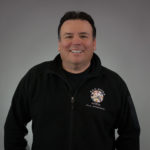 Mike Wiggins Jr. is the Chairman of the Bad River Band of Lake Superior Chippewa. Wiggins is also a major advocate for the conservation of natural resources. Before becoming the chairman of the Bad River Band, Wiggins served as a conservation warden for the Great Lakes Indian Fish and Wildlife Commission. Today, he is a vocal leader in the protection of the Penokee Hills and maintaining safe groundwater. In 2019, Wiggins was named an Outstanding Alumni of UW-Superior. Wiggens got his bachelor’s degree from UW-Superior in 1992.
Mike Wiggins Jr. is the Chairman of the Bad River Band of Lake Superior Chippewa. Wiggins is also a major advocate for the conservation of natural resources. Before becoming the chairman of the Bad River Band, Wiggins served as a conservation warden for the Great Lakes Indian Fish and Wildlife Commission. Today, he is a vocal leader in the protection of the Penokee Hills and maintaining safe groundwater. In 2019, Wiggins was named an Outstanding Alumni of UW-Superior. Wiggens got his bachelor’s degree from UW-Superior in 1992.
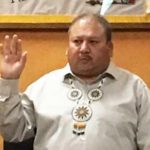 Joseph Wildcat Sr. has been President of the Lac du Flambeau Band of Lake Superior Chippewa since 2016. He is a lifelong resident of the Lac du Flambeau Indian Reservation. The 108-square-mile reservation, established in 1854, is home to about 2,400 Lac du Flambeau members as well as Lake of the Torches Resort and Casino, George W. Brown, Jr. Ojibwe Museum & Cultural Center, Waaswaaganing Indian Bowl Living Arts and Culture Center and other tribal enterprises.
Joseph Wildcat Sr. has been President of the Lac du Flambeau Band of Lake Superior Chippewa since 2016. He is a lifelong resident of the Lac du Flambeau Indian Reservation. The 108-square-mile reservation, established in 1854, is home to about 2,400 Lac du Flambeau members as well as Lake of the Torches Resort and Casino, George W. Brown, Jr. Ojibwe Museum & Cultural Center, Waaswaaganing Indian Bowl Living Arts and Culture Center and other tribal enterprises.
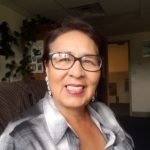 Bobbi Webster is a member of the Oneida Nation and has been the Public Relations Director for the Nation since 1995. Webster has served the Oneida Nation in a number of capacities over the years. She has worked with the Oneida Language Program and taught the Oneida Language in public schools. She has also served as the editor of the Oneida newspaper, Kalihwisaks. Webster has over 35 years of communications experience and has committed her time and expertise to strengthen the Oneida Nation.
Bobbi Webster is a member of the Oneida Nation and has been the Public Relations Director for the Nation since 1995. Webster has served the Oneida Nation in a number of capacities over the years. She has worked with the Oneida Language Program and taught the Oneida Language in public schools. She has also served as the editor of the Oneida newspaper, Kalihwisaks. Webster has over 35 years of communications experience and has committed her time and expertise to strengthen the Oneida Nation.
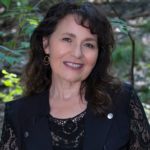 Kimberly Blaeser, a member of the Minnesota Chippewa tribe, is a Native American poet and author. She is a professor at the University of Wisconsin-Milwaukee where she teaches creative writing and Native American Literatures. From 2015-16 she served as the Wisconsin Poet Laureate and published three collections of poetry including “Apprenticed to Justice,” “Absentee Indians and Other Poems” and “Trailing You.” She is an editorial board member for the “American Indian Lives” series of the University of Nebraska Press and for the “Native American Series” of Michigan State University Press and serves on the boards of directors for the Wisconsin Academy of Sciences, Arts, and Letters and the Aldo Leopold Foundation. Blaeser was named a 2020 Fellow by the Wisconsin Academy of Sciences, Arts, and Letters, and has received both a Distinguished Public Service Award and an Outstanding Woman of Color Award from the University of Wisconsin. Blaeser is currently at work on a collection of “Picto-Poems” which combines her photographs and poetry, according to her website.
Kimberly Blaeser, a member of the Minnesota Chippewa tribe, is a Native American poet and author. She is a professor at the University of Wisconsin-Milwaukee where she teaches creative writing and Native American Literatures. From 2015-16 she served as the Wisconsin Poet Laureate and published three collections of poetry including “Apprenticed to Justice,” “Absentee Indians and Other Poems” and “Trailing You.” She is an editorial board member for the “American Indian Lives” series of the University of Nebraska Press and for the “Native American Series” of Michigan State University Press and serves on the boards of directors for the Wisconsin Academy of Sciences, Arts, and Letters and the Aldo Leopold Foundation. Blaeser was named a 2020 Fellow by the Wisconsin Academy of Sciences, Arts, and Letters, and has received both a Distinguished Public Service Award and an Outstanding Woman of Color Award from the University of Wisconsin. Blaeser is currently at work on a collection of “Picto-Poems” which combines her photographs and poetry, according to her website.
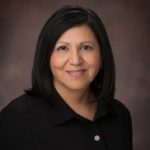 Karen Lincoln Michel, a member of the Ho-Chunk Nation, was recently named President of Indian Country Today, where she oversees the business side of a nonprofit news site that covers indigenous communities. She was editor of Madison Magazine since 2015 and was named publisher in 2018. Michels also served as the 2017-2019 Board President for the Wisconsin Center for Investigative Journalism (WCIJ). She has editorial experience with publications including the La Crosse Tribune, The Dallas Morning News, The New York Times Syndicate, the Green Bay Press-Gazette and as executive editor of The Daily Advertiser in Lafayette, Louisiana. Michels is also the past president of both UNITY: Journalists for Diversity and the Native American Journalists Association.
Karen Lincoln Michel, a member of the Ho-Chunk Nation, was recently named President of Indian Country Today, where she oversees the business side of a nonprofit news site that covers indigenous communities. She was editor of Madison Magazine since 2015 and was named publisher in 2018. Michels also served as the 2017-2019 Board President for the Wisconsin Center for Investigative Journalism (WCIJ). She has editorial experience with publications including the La Crosse Tribune, The Dallas Morning News, The New York Times Syndicate, the Green Bay Press-Gazette and as executive editor of The Daily Advertiser in Lafayette, Louisiana. Michels is also the past president of both UNITY: Journalists for Diversity and the Native American Journalists Association.
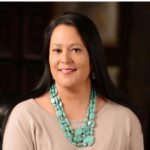 Shannon Holsey is the President of the Stockbridge-Munsee Band of Mohican Indians. She was elected as president in October 2015, following eight years as a member of the Tribal Council. Holsey is the youngest to ever lead the Stockbridge-Munsee, which has about 1,470 enrolled members and is one of 11 Native tribes in Wisconsin. The Stockbridge-Munsee Tribe is the largest employer in Shawano County. She grew up on the Stockbridge-Munsee reservation in Bowler, Wisconsin. Holsey also serves as vice president of the Great Lakes Inter-Tribal Council, which represents 11 member tribes with a land base of about one million acres spanning 45 counties. She is appointed as the Wisconsin State Legislature’s Special Committee on State-Tribal Relations. Hosley is also Co-founder of the Midwest region Woodland Women WEWIN Chapter.
Shannon Holsey is the President of the Stockbridge-Munsee Band of Mohican Indians. She was elected as president in October 2015, following eight years as a member of the Tribal Council. Holsey is the youngest to ever lead the Stockbridge-Munsee, which has about 1,470 enrolled members and is one of 11 Native tribes in Wisconsin. The Stockbridge-Munsee Tribe is the largest employer in Shawano County. She grew up on the Stockbridge-Munsee reservation in Bowler, Wisconsin. Holsey also serves as vice president of the Great Lakes Inter-Tribal Council, which represents 11 member tribes with a land base of about one million acres spanning 45 counties. She is appointed as the Wisconsin State Legislature’s Special Committee on State-Tribal Relations. Hosley is also Co-founder of the Midwest region Woodland Women WEWIN Chapter.
 Douglas Cox was re-elected to serve as Tribal Chairperson for the Menominee Indian Tribe of Wisconsin and will serve in that position for the next year. At the Chairman’s Office, he is the face of the Tribal Legislature and serves as the liaison between the Menominee People and Tribal Government and is responsible for maintaining the Tribe’s relationships with other Tribal Governments, as well as local, state, and federal governments. Cox has worked with the Tribe since 1992.
Douglas Cox was re-elected to serve as Tribal Chairperson for the Menominee Indian Tribe of Wisconsin and will serve in that position for the next year. At the Chairman’s Office, he is the face of the Tribal Legislature and serves as the liaison between the Menominee People and Tribal Government and is responsible for maintaining the Tribe’s relationships with other Tribal Governments, as well as local, state, and federal governments. Cox has worked with the Tribe since 1992.
 Samantha Skenandore, a member of the Ho-Chunk Nation, is an attorney at Quarles & Brady in Madison. Skenandore focuses her practice on federal Indian law and tribal law, and advises her clients in matters such as tribal governance, real estate, labor issues and litigation. She also advises clients on strategies to start businesses, build capacities and prosper. Skenandore received a bachelor’s degree in Behavioral Sciences & Law as well as a certificate in American Indian Studies from the University of Wisconsin – Madison. She then went on to receive her J.D. from the University of Denver Sturm College of Law.
Samantha Skenandore, a member of the Ho-Chunk Nation, is an attorney at Quarles & Brady in Madison. Skenandore focuses her practice on federal Indian law and tribal law, and advises her clients in matters such as tribal governance, real estate, labor issues and litigation. She also advises clients on strategies to start businesses, build capacities and prosper. Skenandore received a bachelor’s degree in Behavioral Sciences & Law as well as a certificate in American Indian Studies from the University of Wisconsin – Madison. She then went on to receive her J.D. from the University of Denver Sturm College of Law.
 Steve Ninham, the general manager at Radisson Hotel & Conference Center in Green Bay, has been working at the Radisson for more than seven years. The Radisson is owned by the Oneida Nation. Ninham, a member of the Oneida Nation, is responsible for managing the hotel and brings more than $20 million in hotel revenue to the Nation. Under Ninham’s management, Radisson Hotel’s sales team won Sales Team of the Year at the Aimbridge Hospitality Awards in 2016. Ninham himself was a finalist for the General Manager of the Year, which he had won twice previously.
Steve Ninham, the general manager at Radisson Hotel & Conference Center in Green Bay, has been working at the Radisson for more than seven years. The Radisson is owned by the Oneida Nation. Ninham, a member of the Oneida Nation, is responsible for managing the hotel and brings more than $20 million in hotel revenue to the Nation. Under Ninham’s management, Radisson Hotel’s sales team won Sales Team of the Year at the Aimbridge Hospitality Awards in 2016. Ninham himself was a finalist for the General Manager of the Year, which he had won twice previously.
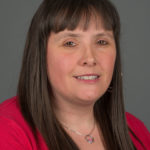 Dr. Heather Ann Moody, a member of the Ho-Chunk Nation, has been an assistant professor of American Indian Studies at the University of Eau-Claire since 2014. In 2019, she earned the UW-System Outstanding Women of Color in Education Award. Moody’s research is centered on American Indian requirements in higher education K-12 and American Indian Food Sovereignty. She currently chairs a statewide body on the American Indian Program Curriculum, which promotes the enforcement of Act 31, Wisconsin’s statute on American Indian Studies. Moody received her bachelor’s degree from the UW-Eau-Claire. She later earned an M.A. in American Indian Studies at the University of Arizona and a Doctorate in Education from the University of Minnesota Duluth.
Dr. Heather Ann Moody, a member of the Ho-Chunk Nation, has been an assistant professor of American Indian Studies at the University of Eau-Claire since 2014. In 2019, she earned the UW-System Outstanding Women of Color in Education Award. Moody’s research is centered on American Indian requirements in higher education K-12 and American Indian Food Sovereignty. She currently chairs a statewide body on the American Indian Program Curriculum, which promotes the enforcement of Act 31, Wisconsin’s statute on American Indian Studies. Moody received her bachelor’s degree from the UW-Eau-Claire. She later earned an M.A. in American Indian Studies at the University of Arizona and a Doctorate in Education from the University of Minnesota Duluth.
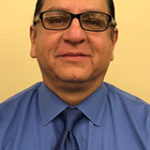 Jeff Bowman, a member of the Stockbridge-Munsee Community, is President and CEO of the Oneida Nation-owned Bay Bank in Green Bay. Bowman is a leader in facilitating economic development and supporting small and Native American-owned businesses. He has over 30 years of experience in the banking industry and has sat on a number of high ranking boards. Currently, Bowman is the President of the First American Capital Corporation Board of Directors. Bowman has also served as a board member of the Wisconsin Business Development Finance Corporation, the American Indian Chamber of Commerce of Wisconsin and the Gerald L. Ignace Indian Health Center, Inc., to name a few.
Jeff Bowman, a member of the Stockbridge-Munsee Community, is President and CEO of the Oneida Nation-owned Bay Bank in Green Bay. Bowman is a leader in facilitating economic development and supporting small and Native American-owned businesses. He has over 30 years of experience in the banking industry and has sat on a number of high ranking boards. Currently, Bowman is the President of the First American Capital Corporation Board of Directors. Bowman has also served as a board member of the Wisconsin Business Development Finance Corporation, the American Indian Chamber of Commerce of Wisconsin and the Gerald L. Ignace Indian Health Center, Inc., to name a few.
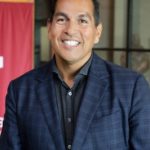 Aaron Bird Bear, a citizen of the Mandan, Hidatsa and Diné nations, is the first tribal relations director at the University of Wisconsin–Madison. His role is to foster relationships between the 12 First Nations of Wisconsin and the university. Before accepting this position, Bird Bear has been a strong First Nation activist on the campus since 2000. In 2003 Bird Bear developed the popular First Nations Cultural Landscape tour at UW-Madison, where thousands of visitors learn about 11 architectural earthwork mound sites and at least 25 human habitation sites dating back 12,000 years. He currently co-leads a group that creates heritage markers on and around Bascom Hill; the “Our Shared Future” markers honor and recognizes the land as the ancestral home of the Ho-Chunk nation.
Aaron Bird Bear, a citizen of the Mandan, Hidatsa and Diné nations, is the first tribal relations director at the University of Wisconsin–Madison. His role is to foster relationships between the 12 First Nations of Wisconsin and the university. Before accepting this position, Bird Bear has been a strong First Nation activist on the campus since 2000. In 2003 Bird Bear developed the popular First Nations Cultural Landscape tour at UW-Madison, where thousands of visitors learn about 11 architectural earthwork mound sites and at least 25 human habitation sites dating back 12,000 years. He currently co-leads a group that creates heritage markers on and around Bascom Hill; the “Our Shared Future” markers honor and recognizes the land as the ancestral home of the Ho-Chunk nation.
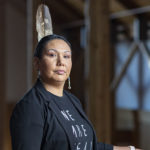 Kiana Beaudin is executive director of the Ho-Chunk Nation’s Department of Health, a job she just took on last year after almost 10 years as a physician’s assistant at the Ho Chunk Nation’s House of Wellness in Baraboo. She provided primary health care to members of Wisconsin’s federally recognized indigenous nations, as well as employees of the Ho-Chunk Nation and their families. She has also led a number of community outreach and education efforts, such as co-creating a cultural competency training for the Ho-Chunk Nation Department of Health, organizing a National Native American HIV/AIDS Awareness Day event, organizing blood pressure and glucose screenings at Ho-Chunk Gaming in Wisconsin Dells, and incorporating the Ho-Chunk language into the clinic setting. For her efforts, she was honored with a Forward Under 40 Award by the Wisconsin Alumni Association in February 2020.
Kiana Beaudin is executive director of the Ho-Chunk Nation’s Department of Health, a job she just took on last year after almost 10 years as a physician’s assistant at the Ho Chunk Nation’s House of Wellness in Baraboo. She provided primary health care to members of Wisconsin’s federally recognized indigenous nations, as well as employees of the Ho-Chunk Nation and their families. She has also led a number of community outreach and education efforts, such as co-creating a cultural competency training for the Ho-Chunk Nation Department of Health, organizing a National Native American HIV/AIDS Awareness Day event, organizing blood pressure and glucose screenings at Ho-Chunk Gaming in Wisconsin Dells, and incorporating the Ho-Chunk language into the clinic setting. For her efforts, she was honored with a Forward Under 40 Award by the Wisconsin Alumni Association in February 2020.
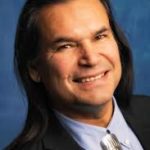 Daniel Brown is the Executive Manager of Ho-Chunk Gaming Madison, a position he began in 2012. Brown earned his bachelor’s degree in Criminal Justice from Ball State University in 1990. In late 1993, he moved his family to Wisconsin where he began his career in the casino industry at Ho-Chunk Gaming Wisconsin Dells with his tribe, the Ho-Chunk Nation. After beginning in Surveillance, Daniel eventually became the Director of Casino Operations; Assistant General Manager; and finally the General Manager, where he managed the Nation’s flagship casino for four years. From 2007-2011, Daniel served as the vice president of the Ho-Chunk Nation. As Executive Manager of Ho-Chunk Gaming Madison, Daniel is endeavoring to develop 40-plus acres near the casino in collaboration with the City of Madison.
Daniel Brown is the Executive Manager of Ho-Chunk Gaming Madison, a position he began in 2012. Brown earned his bachelor’s degree in Criminal Justice from Ball State University in 1990. In late 1993, he moved his family to Wisconsin where he began his career in the casino industry at Ho-Chunk Gaming Wisconsin Dells with his tribe, the Ho-Chunk Nation. After beginning in Surveillance, Daniel eventually became the Director of Casino Operations; Assistant General Manager; and finally the General Manager, where he managed the Nation’s flagship casino for four years. From 2007-2011, Daniel served as the vice president of the Ho-Chunk Nation. As Executive Manager of Ho-Chunk Gaming Madison, Daniel is endeavoring to develop 40-plus acres near the casino in collaboration with the City of Madison.
 Rebecca Comfort is the American Indian Nations Liaison with the Wisconsin Historical Society, where she develops, strengthens, and maintains relationships with the 12 American Indian nations of Wisconsin, including tribal councils and other elected representatives.A member of the Keweenaw Bay Indian Community band of Lake Superior Ojibwe, Comfort also develops ongoing relationships with Tribal Historic Preservation Officers (THPOs), tribal libraries, museums, and education offices and leads and serves on internal Wisconsin Historical Society teams that work directly with relationships and projects involving American Indian nations.
Rebecca Comfort is the American Indian Nations Liaison with the Wisconsin Historical Society, where she develops, strengthens, and maintains relationships with the 12 American Indian nations of Wisconsin, including tribal councils and other elected representatives.A member of the Keweenaw Bay Indian Community band of Lake Superior Ojibwe, Comfort also develops ongoing relationships with Tribal Historic Preservation Officers (THPOs), tribal libraries, museums, and education offices and leads and serves on internal Wisconsin Historical Society teams that work directly with relationships and projects involving American Indian nations.
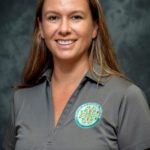 Dr. Amy DeLong is a family physician and Ho-Chunk tribal member who has worked at the Ho-Chunk Nation House of Wellness Clinic for 13 years. She earned her Bachelor’s of Science from the University of Michigan, completed medical school at the University of Minnesota and completed her training in family medicine at Hennepin County Medical Center in Minneapolis. She earned her Master’s in Public Health in the maternal-child health track while completing an adolescent health fellowship through the University Of Minnesota Department Of Pediatrics. Her passions include public health efforts to prevent chronic disease like obesity, especially in childhood, promoting healthy pregnancy outcomes, reducing health disparities by diversifying the workforce, and being outdoors with her family.
Dr. Amy DeLong is a family physician and Ho-Chunk tribal member who has worked at the Ho-Chunk Nation House of Wellness Clinic for 13 years. She earned her Bachelor’s of Science from the University of Michigan, completed medical school at the University of Minnesota and completed her training in family medicine at Hennepin County Medical Center in Minneapolis. She earned her Master’s in Public Health in the maternal-child health track while completing an adolescent health fellowship through the University Of Minnesota Department Of Pediatrics. Her passions include public health efforts to prevent chronic disease like obesity, especially in childhood, promoting healthy pregnancy outcomes, reducing health disparities by diversifying the workforce, and being outdoors with her family.
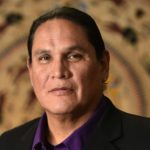 Ernie Stevens Jr. is the chairman and national spokesperson of the National Indian Gaming Association. A member of the Oneida Nation, he iis currently in his ninth two-year term as the chairman. During his time, he has worked to educate Congress, the media and the public about the benefits of Indian gaming on tribal and nearby communities. He has also worked to protect Tribal Sovereignty and strengthen the Indian gaming industry. Stevens received an Associate’s degree from Haskell Indian National University and went on to also earn a Bachelor’s degree in Criminal Justice from Mount Scenario College.
Ernie Stevens Jr. is the chairman and national spokesperson of the National Indian Gaming Association. A member of the Oneida Nation, he iis currently in his ninth two-year term as the chairman. During his time, he has worked to educate Congress, the media and the public about the benefits of Indian gaming on tribal and nearby communities. He has also worked to protect Tribal Sovereignty and strengthen the Indian gaming industry. Stevens received an Associate’s degree from Haskell Indian National University and went on to also earn a Bachelor’s degree in Criminal Justice from Mount Scenario College.
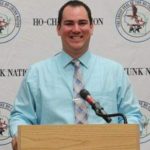 Ryan Greendeer currently serves as the Public Relations Officer of the Ho-Chunk Nation. Greendeer previously served as a policy consultant for tribal governments and agencies. Prior to that, he built and maintained connections between tribes and the Wisconsin Department of Transportation as a Tribal Liaison. Greendeer’s position at the Department of Transportation placed him as the primary contact for tribal elected officials, regional tribal liaisons, and the Great Lakes Intertribal Council. Greendeer served in the U.S. Army for over eight years before earning a degree in biochemistry from the University of Wisconsin-Milwaukee.
Ryan Greendeer currently serves as the Public Relations Officer of the Ho-Chunk Nation. Greendeer previously served as a policy consultant for tribal governments and agencies. Prior to that, he built and maintained connections between tribes and the Wisconsin Department of Transportation as a Tribal Liaison. Greendeer’s position at the Department of Transportation placed him as the primary contact for tribal elected officials, regional tribal liaisons, and the Great Lakes Intertribal Council. Greendeer served in the U.S. Army for over eight years before earning a degree in biochemistry from the University of Wisconsin-Milwaukee.
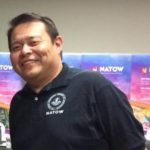 Peter LaBlanc is Chairman of the Board of Directors for the Native American Tourism of Wisconsin (NATOW), an inter-tribal consortium that launched as a statewide initiative in 1994 by the Great Lakes Inter-Tribal Council. The mission of NATOW is to promote tourism featuring Native American heritage and culture, allowing tribes to diversify their economies while telling the true story concerning their history and culture. LaBlanc also serves as a Tribal Liaison Director at St. Croix Chippewa Indians of Wisconsin.
Peter LaBlanc is Chairman of the Board of Directors for the Native American Tourism of Wisconsin (NATOW), an inter-tribal consortium that launched as a statewide initiative in 1994 by the Great Lakes Inter-Tribal Council. The mission of NATOW is to promote tourism featuring Native American heritage and culture, allowing tribes to diversify their economies while telling the true story concerning their history and culture. LaBlanc also serves as a Tribal Liaison Director at St. Croix Chippewa Indians of Wisconsin.
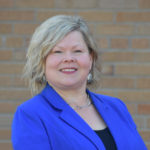 Laura Laitinen-Warren is a Senior Policy Adviser for the Chairman’s Office of the Oneida Nation. In this role, she provides the Tribal Chair with governmental policy advice and recommendations on matters relating to Oneida Tribal government affairs. Laitinen-Warren has over 25 years of experience working in Indian Country in a variety of leadership positions in Oneida Casino’s gaming industry as well as human resources. She was also invited to participate and moderate the Women of Excellence panel for 2019’s Wisconsin Leadership Summit. Laitinen-Warren has a Bachelor’s Degree in Social Welfare from the University of Wisconsin-Madison, a Master’s Degree in Educational Leadership from the University of Wisconsin-Oshkosh, and an Educational Specialist Certification from the University of Wisconsin-Madison. Currently, she is completing her dissertation exploring the identity formation and lived experiences of multiracial leaders.
Laura Laitinen-Warren is a Senior Policy Adviser for the Chairman’s Office of the Oneida Nation. In this role, she provides the Tribal Chair with governmental policy advice and recommendations on matters relating to Oneida Tribal government affairs. Laitinen-Warren has over 25 years of experience working in Indian Country in a variety of leadership positions in Oneida Casino’s gaming industry as well as human resources. She was also invited to participate and moderate the Women of Excellence panel for 2019’s Wisconsin Leadership Summit. Laitinen-Warren has a Bachelor’s Degree in Social Welfare from the University of Wisconsin-Madison, a Master’s Degree in Educational Leadership from the University of Wisconsin-Oshkosh, and an Educational Specialist Certification from the University of Wisconsin-Madison. Currently, she is completing her dissertation exploring the identity formation and lived experiences of multiracial leaders.
 Dr. Jolene Bowman is Director of Education and Career Services for the Stockbridge-Munsee Community, a position in which she’s served since 2006. She also serves in the Wisconsin Indian Education Association representing the Central Region and the Wisconsin Tribal Education Directors Association. She was Stockbridge-Munsee Vice President from 2015 to 2017, and president of the National Indian Education Association in 2018. She holds a Doctorate in Leadership for the Advancement of Learning and Service in Higher Education from Cardinal Stritch.
Dr. Jolene Bowman is Director of Education and Career Services for the Stockbridge-Munsee Community, a position in which she’s served since 2006. She also serves in the Wisconsin Indian Education Association representing the Central Region and the Wisconsin Tribal Education Directors Association. She was Stockbridge-Munsee Vice President from 2015 to 2017, and president of the National Indian Education Association in 2018. She holds a Doctorate in Leadership for the Advancement of Learning and Service in Higher Education from Cardinal Stritch.
Who did we miss? If you’d like to nominate someone for next year’s list, please email [email protected].


























